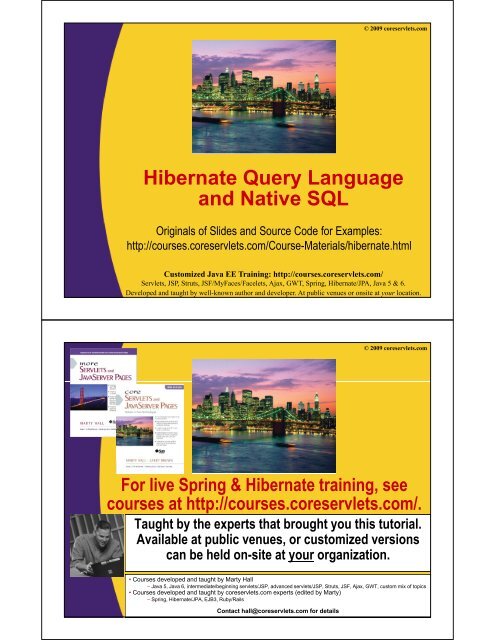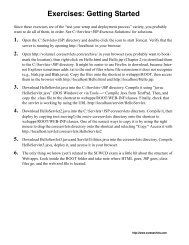Hibernate Query Language Hibernate Query Language and Native
Hibernate Query Language Hibernate Query Language and Native
Hibernate Query Language Hibernate Query Language and Native
Create successful ePaper yourself
Turn your PDF publications into a flip-book with our unique Google optimized e-Paper software.
Topics in This Section• Spend some time learning aboutthe <strong>Hibernate</strong> <strong>Query</strong> <strong>Language</strong>,<strong>and</strong> how to leverage it to writedatabase queries• Prepare ourselves for cases wherewe need to write our own SQL byunderst<strong>and</strong>ing how to accomplishits execution through <strong>Hibernate</strong>5© 2009 coreservlets.comThe <strong>Hibernate</strong> <strong>Query</strong><strong>Language</strong>Originals of Slides <strong>and</strong> Source Code for Examples:http://courses.coreservlets.com/Course-Materials/hibernate.htmlCustomized Java EE Training: http://courses.coreservlets.com/Servlets, JSP, Struts, JSF/MyFaces/Facelets, Ajax, GWT, Spring, <strong>Hibernate</strong>/JPA, Java 5 & 6.Developed <strong>and</strong> taught by well-known author <strong>and</strong> developer. At public venues or onsite at your location.
<strong>Hibernate</strong> <strong>Query</strong> <strong>Language</strong> g (HQL)• Similar to SQL– Object based. Instead of tables <strong>and</strong> columns, syntaxincludes objects <strong>and</strong> attributes• Underst<strong>and</strong>s inheritance– Can issue a query using a superclass or interface• <strong>Hibernate</strong> engine may turn one HQLstatement into several SQL statements– Does not allow for SQL database hints• Bypasses any object caches, such as thepersistence context or 2 nd Level Cacheorg.hibernate.<strong>Query</strong>• Main class used for building <strong>and</strong> executingHQL• Similar to a JDBC prepared statement– Bind parameter values• setLong(), setString(), setDate() etc…• setParameter();– Generic way of binding variables– Submit Requests• list() ;– Execute, <strong>and</strong> return a collection of result objects• uniqueResult();Execute <strong>and</strong> return a single result object– Execute <strong>and</strong> return a single result object• Created using the <strong>Hibernate</strong> Session
Basic Object Queries// return all CheckingAccounts<strong>Query</strong> getAllCheckingAccounts =session.create<strong>Query</strong>("from CheckingAccount");List checkingAccounts = getAllCheckingAccounts.list();// return all Account types<strong>Query</strong> getAllAccounts =session.create<strong>Query</strong>("from Account");Does not require a select clause,just the object class nameList accounts = getAllAccounts.list();// return ALL object types<strong>Query</strong> getAllAccounts =session.create<strong>Query</strong>("from java.lang.Object");List objects = getAllObjects.list();Binding <strong>Query</strong> Parameters• Position-based– Just like JDBC– Set parameters in an ordered fashion, starting with zero• Name-based– Use names as placeholders– Set parameters by name• Pros/Cons– Position-based faster on executing variable substitution– Name-based doesn’t require code changes if a newparameter gets added in the middle of the statement
Position-Based Parameters// return all Accounts based on// balance <strong>and</strong> creation dateString query = "from Account a where"+ " a.balance > ?"+ " <strong>and</strong> a.creationDate > ?";// deprecated. for demo onlyDate date = new Date(2008, 12, 01);Can alias objects,just like in SQL<strong>Query</strong> getAccounts = session.create<strong>Query</strong>(query).setLong(0, 1000)Can set parameters in order, justlike a JDBC PreparedStatement.setDate(1, date);List accounts = getAccounts.list();Name-Based Parameters// return all Accounts based on// balance <strong>and</strong> creation dateString query = "from Account a where"+ " a.balance > :someBalance"+ " <strong>and</strong> a.creationDate > :someDate";// deprecated. for demo onlyDate date = new Date(2008, 12, 01);// order doesn’t matter<strong>Query</strong> getAccounts = session.create<strong>Query</strong>(query).setDate("someDate", date).setLong("someBalance", 1000);List accounts = getAccounts.list();
Setting Parameters Generically// return all Accounts based on// balance <strong>and</strong> creation dateString query = "from Account a where"+ " a.balance > :someBalance"+ " <strong>and</strong> a.creationDate > :someDate";// deprecated. for demo onlyDate date = new Date(2008, 12, 01);// order doesn’t matter.// Temporal (time) values need to be specified<strong>Query</strong> getAccounts = session.create<strong>Query</strong>(query).setParameter("someBalance", 1000).setParameter("someDate", date, <strong>Hibernate</strong>.DATE);List accounts = getAccounts.list();Binding by Object• Name-based binding acceptsan entire object for settingquery parameters– Placeholder names must match objectattribute names– <strong>Hibernate</strong> uses reflection/java beanproperties to map the attributes• Doesn’t work with temporaldata types– Like Date
Binding by Object// return all Accounts based on// balance <strong>and</strong> creation dateString query = "from EBill e where"+ " e.balance > :balance"+ " <strong>and</strong> e.ebillerId > :ebillerId";EBill queryParams = new EBill();queryParams.setBalance(1000);queryParams.setEbillerId(1);Assume an object with attribute namesthat matched the placeholder names...// this will use java bean properties/reflection// to bind the variables<strong>Query</strong> getEBills = session.create<strong>Query</strong>(query).setProperties(queryParams);List accounts = getEBills.list();…pass that object in toset the parameter valuesPagination• Break up large result sets into smallergroups (pages)– setFirstResults(int startRow);• Set the starting record position• Zero-based indexing– setMaxResults(int t numberToGet);• Set the number of records to retrieve• Keep track of current index in order tocontinue paging data through the data
Pagination// retrieve initial page, up to 50 records<strong>Query</strong> getAccountsPage1 =session.create<strong>Query</strong>("from Account").setMaxResult(50);...// retrieve subsequent pages, passing// in the first record to start with<strong>Query</strong> getAccountsNextPage =session.create<strong>Query</strong>("from Account").setFirstResult(:startingIndex).setMaxResult(50);Setting Timeout• Set the time allowed for aspecified query to execute– setTimeout(int second);– <strong>Hibernate</strong> will throw an exception if limitis exceeded• Based on the JDBC timeoutimplementation
Setting Timeouttry {// retrieve accounts, allow 30 seconds<strong>Query</strong> getAccounts =session.create<strong>Query</strong>("from Account").setTimeout(30);List accounts = getAccountsPage1.list();}catch (<strong>Hibernate</strong>Exception) {...}...Setting Fetch Size• Optimization hint leveraged by theJDBC driver– Not supported by all vendors, but if available,<strong>Hibernate</strong> will user this to optimize data retrieval• Used to indicate the number of recordsexpected to be obtained in a readaction– If paging, should set to page size
Setting Fetch Size// retrieve initial page, up to 50 records<strong>Query</strong> getAccountsPage1 =session.create<strong>Query</strong>("from Account").setMaxResult(50).setFetchSize(50);...// retrieve subsequent pages, passing// in the first record to start with<strong>Query</strong> getAccountsNextPage =session.create<strong>Query</strong>("from Account").setFirstResult(:startingIndex).setMaxResult(50).setFetchSize(50);Adding Comments to <strong>Query</strong>• Developer provided commentsincluded in the log along with the<strong>Hibernate</strong> SQL statement– setComment(String comment);– Need to enable 'user_sql_comments' in the<strong>Hibernate</strong> configurationi• Assists in distinguishing user-generated queries vs. <strong>Hibernate</strong>generated– Also be used to explain query intentioni
Adding Comments to <strong>Query</strong>// retrieve initial page, up to 50 records<strong>Query</strong> getAccountsPage1 g =session.create<strong>Query</strong>("from Account").setMaxResult(50).setComment("Retrieving first page ofAccount objects");...// retrieve subsequent pages, passing// in the first record to start with<strong>Query</strong> getAccountsNextPage =session.create<strong>Query</strong>("from Account").setFirstResult(:startingIndex).setMaxResult(50).setComment("Retrieving page: " + pageNum);Combining Settings• Settings can be combined together ona single query• Set on individual queries, not acrossall HQL queries
Combined Settings<strong>Query</strong> getAccountPage1 =session.create<strong>Query</strong>("from Account").setMaxResult(50).setFetchSize(50).setTimeout(60).setComment("Retrieving all account objects");List accounts = getAccounts.list();...<strong>Query</strong> getAccountNextPage =session.create<strong>Query</strong>("from Account").setFirstResult(:startingIndex).setMaxResult(25).setFetchSize(25).setTimeout(30).setComment("Retrieving page " + pageNum);Externalizing Queries• Define queries in object mapping files• Can be ‘global’ or included insideclass definition– If inside class definition, need to prefix with fullyqualified class name when calling• Isolates the SQL statements– Useful if you want to modify all queries• Optimize queries• Switch vendors• May not require recompiling code
External: Global
Calling Externalizing Queries// globally named query<strong>Query</strong> getAccounts =session.getNamed<strong>Query</strong>("getAllAccounts")List accounts = getAccounts.list();...// defined within class definition<strong>Query</strong> getAccountByBalance =session.getNamed<strong>Query</strong>(edQue "courses.hibernate.vo.Account.getAccountByBalance").setParameter("someBalance", 1000)List accounts = getAccountByBalance.list();Specifying Order...<strong>Query</strong> getAccounts =session.create<strong>Query</strong>("from Accountorder by balance desc, creationDateasc")List accounts = getAccounts.list();...
Specifying Columns• Requires the use of the ‘select’keyword• Returns a list of object arrays– Each index in the list contains an object array ofthe values for that row– Within each object array, columns are ordered aslisted• Index 0 is the first identified column• Index 1 is the second identified column• Index n-1 is the nth identified column• Loop through the returned list of returnedrow column objectsSpecifying Columns<strong>Query</strong> getAccountInfo = session.create<strong>Query</strong>("select accountId, balance from Account");// get a list of results, where each result is// an object array representing one row of dataList listOfRowValues l = getAccountsInfo.list();t t()// for each object array...for (Object[] singleRowValues : listOfRowValues) {// ...pull off the accountId <strong>and</strong> balancelong accountId = (Long)singleRowValues[0];double balance = (Double)singleRowValues[1];}
Using SQL/Database Functions<strong>Query</strong> getAccountOwners =session.create<strong>Query</strong>("select upper(lastName),lower(firstName),sysdatefrom AccountOwner");Performing Joins• Implicit association join• Ordinary join in the from clause• Fetch join in the from clause• Theta-style t join in the whereclause
Implicit Association Join• Leverages the associations identifiedin the object’s mapping file to figureout what SQL needs to be generated• Uses dot notation to access theassociated object in the query• Only works for a single associationreference– Does not work against collections of objectsImplicit Association Join• Search for EBills by the name of theEBiller, through the EBill object<strong>Query</strong> getVisaCardEbills =session.create<strong>Query</strong>("from EBill ebill whereebill.ebiller.name like '%VISA%' "List ebills = getVisaCardEbills.list();li t()
EBill issued from EBiller...courses.hibernate.vo.EBiller _____________________________________________________
Ordinary Join<strong>Query</strong> getVisaCardEbills =session.create<strong>Query</strong>("from EBill ebilljoin ebill.ebiller ebillerwhere ebiller.name like '%VISA%' "// get a list of results, where each result is// an object array representing one row of dataList listOfRowValues = getVisaCardEbills.list();// returns BOTH object typesfor (Object[] singleRowValues : listOfRowValues) {// ...pull off the EBill <strong>and</strong> EBillerEBill ebill = (EBill)singleRowValues[0];EBiller ebiller = (EBiller)singleRowValues[1];...}EBill issued from EBiller...courses.hibernate.vo.EBiller _____________________________________________________
Ordinary Join –Return One Type<strong>Query</strong> getVisaCardEbills =session.create<strong>Query</strong>("select ebill from EBill ebilljoin ebill.ebiller ebillerwhere ebiller.name like '%VISA%' "List visaBills =getVisaCardEbills.list();Ordinary Join –Collections<strong>Query</strong> getVisaCardEbills =session.create<strong>Query</strong>("from EBiller ebillerjoin ebiller.ebills ebillwhere ebill.balance > 500"// get a list of results, where each result is// an object array representing one row of dataList listOfRowValues = getVisaCardEbills.list();// go through the rows of object arraysaysfor (Object[] singleRowValues : listOfRowValues) {// ...pull off the EBiller <strong>and</strong> EBillEBiller ebiller = (EBiller)singleRowValues[0];EBill ebill = (EBill)singleRowValues[1];...}
Left Outer Joins• Bring back all items of the 'left'side of a relationship, even if thereis no matching 'right' side– If there IS a matching right side, bring thatback too– Returns all objects in an object array perrow• Returns all objects in an objectarray per row• Used for eager loading of objectsAccountTransactionsmay have EBills......
Left Outer Join<strong>Query</strong> getEBills =session.create<strong>Query</strong>("from EBill ebillleft join ebill.accountTransaction whereebill.balance > 500";List listOfRowValues l = getDebitTransactions.list();i for (Object[] singleRowValues : listOfRowValues) {// pull off the EBillEBill ebill = (EBill)singleRowValues[0];...}// we may or may not have an AccountTransaction.// if no related AccountTransaction, value is nullAccountTransaction atx =(AccountTransaction)singleRowValues[1];Fetch Join• Return a single object type withspecified associations fullyinitialized• Results in fewer, more optimized,SQL statements• Used for eager loading or objects• Never fetch more than onecollection in parallel– Will result in a Cartesian product– Can fetch many single-valued associations
Fetch Join<strong>Query</strong> getEBills =session.create<strong>Query</strong>("from EBill ebilljoin fetch ebill.accountTransaction whereebill.balance > 500";List listOfRowValues l = getDebitTransactions.list();i for (Object[] singleRowValues : listOfRowValues) {// pull off the EBillEBill ebill = (EBill)singleRowValues[0];// we may or may not have an AccountTransaction.// if no related AccountTransaction, value is nullAccountTransaction atx =(AccountTransaction)singleRowValues[1];}...Theta-Style Join• Join in a traditional SQL-likeformat• Does not support outer joins• Can join otherwise unrelatedobjects– Objects not associated in mapping files
Theta-Style Join<strong>Query</strong> getVisaCardEmployees =session.create<strong>Query</strong>("select ownerfrom AccountOwner owner, EBiller ebillerwhereowner.cellPhone = ebiller.phone <strong>and</strong>ebiller.name like '%VISA%' "}List visaEmployees =getVisaCardEmployees.list();...© 2009 coreservlets.comAggregationsCustomized Java EE Training: http://courses.coreservlets.com/Servlets, JSP, Struts, JSF/MyFaces/Facelets, Ajax, GWT, Spring, <strong>Hibernate</strong>/JPA, Java 5 & 6.Developed <strong>and</strong> taught by well-known author <strong>and</strong> developer. At public venues or onsite at your location.
HQL Aggregation g Functions• Functions that operate againstgroups of resulting records• Supported functions include:– count();– min();– max();– sum();– avg();Count Function<strong>Query</strong> count<strong>Query</strong> =session.create<strong>Query</strong>("select count(ao) fromAccountOwner ao "long cnt =long cnt =(Long)count<strong>Query</strong>.uniqueResult();
Min, Max, <strong>and</strong> Avg Functions<strong>Query</strong> accountStats<strong>Query</strong> =session.create<strong>Query</strong>("select min(a.balance), max(a.balance),avg(a.balance) from Account a");List listOfRowValues l = accountStats<strong>Query</strong>.list();t t()for (Object[] singleRowValues : listOfRowValues) {// pull off the valuesdouble min = (Double)singleRowValues[0];double max = (Double)singleRowValues[1];double avg = (Double)singleRowValues[2];}Group By <strong>and</strong> Having• Group subsets of returned results– ‘group by’ clause, just like SQL• Restrict groups returned– ‘having’ clause, also like SQL
Group By Aggregationg<strong>Query</strong> avgTxAmountPerAccount<strong>Query</strong> =session.create<strong>Query</strong>("select atx.account.accountId,avg(atx.amount)fromAccountTransaction atxgroup byatx.account.accountId");List listOfRowValues =avgTxAmountPerAccount<strong>Query</strong>.list();for (Object[] singleRowValues : listOfRowValues) {// pull off the valueslong accountId = (Long)singleRowValues[0];double average = (Double)singleRowValues[1];}Having Aggregation g Restriction<strong>Query</strong> avgTxAmountPerAccount<strong>Query</strong> =session.create<strong>Query</strong>("select atx.account.accountId,avg(atx.amount)fromAccountTransaction atxgroup byatx.account.accountIdhavingcount(atx) > 20");List listOfRowValues =avgTxAmountPerAccount<strong>Query</strong>.list();for (Object[] singleRowValues : listOfRowValues) {// pull off the valueslong accountId = (Long)singleRowValues[0];double average = (Double)singleRowValues[1];}
© 2009 coreservlets.com<strong>Native</strong> SQLCustomized Java EE Training: http://courses.coreservlets.com/Servlets, JSP, Struts, JSF/MyFaces/Facelets, Ajax, GWT, Spring, <strong>Hibernate</strong>/JPA, Java 5 & 6.Developed <strong>and</strong> taught by well-known author <strong>and</strong> developer. At public venues or onsite at your location.<strong>Native</strong> SQL Queries• Write traditional SQL statements<strong>and</strong> execute them through the<strong>Hibernate</strong> engine– <strong>Hibernate</strong> can h<strong>and</strong>le the result set• Needed for very complicatedqueries or taking advantage ofsome database features, like hints
Returning Scalar Values –All Columns<strong>Query</strong> getEBills =session.createSQL<strong>Query</strong>("SELECT * FROM EBILL");List listOfRowValues =getEBills.list();for (Object[] singleRowValues : listOfRowValues) {// returned in the order on the tablelong id = (long)singleRowValues[0];double balance = (balance)singleRowValues[1];...}Return List of Objects<strong>Query</strong> getEBills =session.createSQL<strong>Query</strong>("SELECT * FROM EBill").addEntity(EBill.class);l List ebills =getEBills.list();
Returning Scalar Values –Projection<strong>Query</strong> getScalarVariables =session.createSQL<strong>Query</strong>("SELECT E.EBILL_ID AS ID,EB.BALANCE AS BALANCEFROM EBILL EB").addScalar("id", <strong>Hibernate</strong>.LONG).addScalar("balance", <strong>Hibernate</strong>.DOUBLE);List listOfRowValues =getScalarVariables.list();for (Object[] singleRowValues : listOfRowValues) {long id = (Long)singleRowValues[0];double balance = (Double)singleRowValues[1];}Combining Scalars <strong>and</strong> Objects<strong>Query</strong> getComboInfo =session.createSQL<strong>Query</strong>("SELECTE.EBILL_ID AS ID,EBLR.*FROMEBILL E, EBILLER EBLR").addScalar("id", <strong>Hibernate</strong>.LONG).addEntity("EBLR", EBiller.class);List listOfRowValues = getComboInfo.list();for (Object[] singleRowValues : listOfRowValues) {long id = (Long)singleRowValues[0];EBiller eblr = (EBiller)singleRowValues[1];}
© 2009 coreservlets.comWrap-upCustomized Java EE Training: http://courses.coreservlets.com/Servlets, JSP, Struts, JSF/MyFaces/Facelets, Ajax, GWT, Spring, <strong>Hibernate</strong>/JPA, Java 5 & 6.Developed <strong>and</strong> taught by well-known author <strong>and</strong> developer. At public venues or onsite at your location.Summary• Learned how to use HQL to execute queries bybinding dynamic parameters <strong>and</strong> settings– Named <strong>and</strong> position based binding– Paging, fetch-size, timeout, comments• Saw how to externalize our queries formaintenance purposes– In mapping files globally, or within class definitions• Joins, Joins, Joins– Implicitly; in from clause; with eager loading; traditionalSQL-style• Aggregations:– Grouping <strong>and</strong> Having• <strong>Native</strong> SQL– Returning both scalar <strong>and</strong> object results
Preview of Next Sections• <strong>Hibernate</strong> Advanced Features65© 2009 coreservlets.comQuestions?Customized Java EE Training: http://courses.coreservlets.com/Servlets, JSP, Struts, JSF/MyFaces/Facelets, Ajax, GWT, Spring, <strong>Hibernate</strong>/JPA, Java 5 & 6.Developed <strong>and</strong> taught by well-known author <strong>and</strong> developer. At public venues or onsite at your location.
















